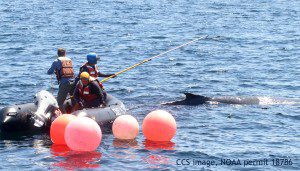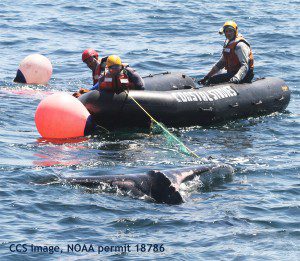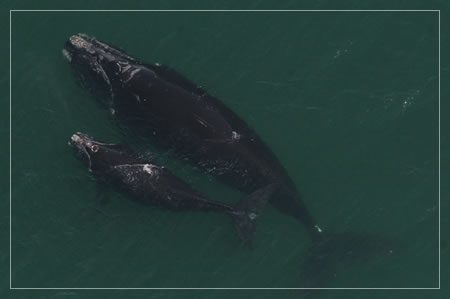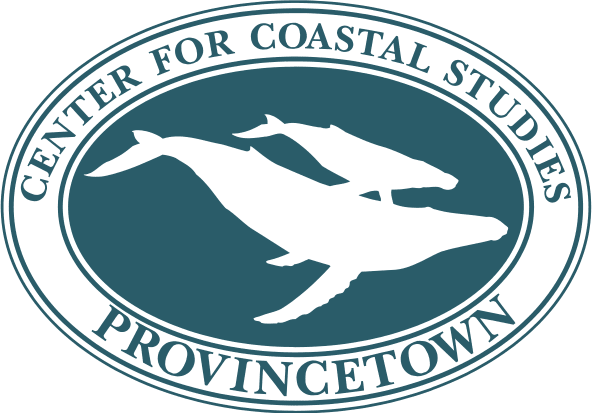
Responders used a hooked knife on the end of a long pole to cut away the entanglement. CCS image, NOAA permit #18786
August 2, 2015
On Sunday, August 2 the Marine Animal Entanglement Response team (MAER) at the Center for Coastal Studies (CCS) disentangled a young humpback whale in Cape Cod Bay. The whale had fishing gear trapped in its mouth and was in very poor condition when discovered early in the morning on Sunday by the CCS Humpback Whale Studies Program. The MAER team freed the animal after an eleven hour operation and was helped by entanglement responders from the West Coast of Mexico.
The whale was spotted by the humpback researchers just off Wood End Light in Provincetown at 5:30 am on Sunday morning.
“The whale had a large amount of gear in its mouth and likely had been entangled for weeks” said Scott Landry, director of MAER. “The whale was very small, around 30 feet, and not very easy to see when it was discovered by the humpback team. Had they not found the whale its prognosis would have been very poor”.

Responders selectively cut away gear from the whale over period of hours. CCS image, NOAA permit #18786
The team used grappling hooks to attach working ropes to the entanglement on the whale. Buoys were added to the working ropes to slow the whale and keep it at the surface. After a thorough assessment the team found that the whale had rope and netting through its mouth that was dragging deep into the water. Using knives at the end of long poles the team selectively cut away the entanglement over a period of several hours.
“The whale was in a much better position by the time we ended the operation late in the afternoon off Plymouth. That being said, the whale was not in great condition from its entanglement and has a lot of work to do in healing” said Landry.
The team was joined by Karel Beets and Ricky Rebolledo of the Red de Asistencia a Ballenas Enmalladas (RABEN), the whale disentanglement network of Mexico. They have joined the CCS MAER team for three weeks as part of a fellowship program supported by several NGO’s and coordinated by the Global Whale Entanglement Response Network, a conservation and welfare initiative of the International Whaling Commission, in partnership with CCS.
CCS is deeply invested in making the response to entangled whales as safe for humans and whales as possible, hosting groups from many nations as part of that effort. “Yesterday was a great experience” said Beets, “It reinforced the need for all responders to be methodical in how they deal with entangled whales, taking each step slowly and as a team”.
Boaters in the Northeast are urged to report any entanglement sightings of whales, sea-turtles and other marine animals to the Marine Animal Entanglement Response Hotline (1-800-900-3622) or the US Coast Guard, and to stand by the animal at a safe distance until trained responders arrive.
CCS disentanglement work is supported by a grant from the National Marine Fisheries Service (NMFS)and the Massachusetts Division of Marine Fisheries (MA-DMF), and the Massachusetts Environmental Trust.
The fellowship program is supported by World Animal Protection and the DJ & T Foundation
The CCS MAER program also receives support from the Massachusetts Environmental Trust. Support is also provided by the Pegasus Foundation, the Hermann Foundation, the Mary P. Dolciani Halloran Foundation, the G. Unger Vetlesen Foundation, the Grace W. Allsop Foundation, the MALLRD Foundation, and contributions from CCS members.
All disentanglement activities are conducted under a federal permit authorized by NOAA.

Our Work
Humpback Whale Research
Right Whale Research
Marine Animal Entanglement Response
Marine Geology Department
Water Quality Monitoring Program
Marine Fisheries Research
Seal Research
Shark Research
Marine Education
Interdisciplinary
Marine Debris and Plastics Program
Marine Policy Initiative
Cape Cod Climate Change Collaborative
Publications

